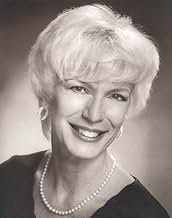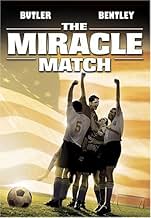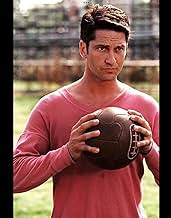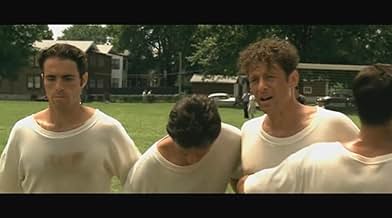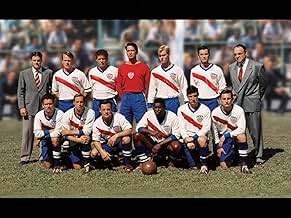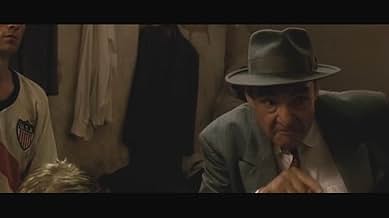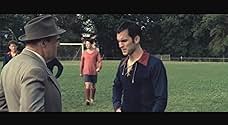AVALIAÇÃO DA IMDb
6,1/10
3,6 mil
SUA AVALIAÇÃO
No ano de 1950, na pequena cidade de St. Louis, um grupo de rapazes batalha por um objetivo, embarcar para a Copa do Mundo no Brasil. Eles são atletas amadores de futebol, um esporte novo pa... Ler tudoNo ano de 1950, na pequena cidade de St. Louis, um grupo de rapazes batalha por um objetivo, embarcar para a Copa do Mundo no Brasil. Eles são atletas amadores de futebol, um esporte novo para o público americano.No ano de 1950, na pequena cidade de St. Louis, um grupo de rapazes batalha por um objetivo, embarcar para a Copa do Mundo no Brasil. Eles são atletas amadores de futebol, um esporte novo para o público americano.
- Direção
- Roteiristas
- Artistas
Zachery Ty Bryan
- Harry Keough
- (as Zachery Bryan)
John Rhys-Davies
- Bill Jeffrey
- (as John Rhys Davies)
Thomas Charles Simmons
- Joe Calcaterra
- (as Thomas C. Simmons)
- Direção
- Roteiristas
- Elenco e equipe completos
- Produção, bilheteria e muito mais no IMDbPro
Avaliações em destaque
This film records the most unlikely upset in World Cup history, the 1-0 United States defeat of England in the Brazilian mining city of Belo Horizonte ("Beautiful Horizon"), 300 miles north of Rio di Janeiro, on June 29, 1950. The United States was a team of part time amateurs who were drawn against the mighty English squad, playing in its first World Cup and determined to show the world their mastery of the game they had invented. Football fans who saw the score reported assumed the score line was a typographical error, as it was unthinkable that the US could even stay with, much less defeat, an English side which featured some of the games all time great players, including Billy Wright, Sir Stanley Matthews (who sat out the match), Stan Mortenson and Wilf Mannion. London bookmakers offered odds of 500-1 against such an preposterous event. The New York Times refused to run the score when it was first reported, deeming it a hoax.
The US team was a collection of first generation American soccer players drawn mainly from club teams on the east coast and included five St. Louisans, four of whom grew up in the "Hill" neighborhood of South St. Louis: goalie Frank Borghi, fullback Frank Colombo, forward Gino Pariani, and midfielder Frank "Pee Wee" Wallace, and also the long time St. Louis University soccer coach, halfback Harry Keough. The US had only one full time professional player on its roster, Hugh McIllvenny from Scotland. They had played together only two weeks when they departed for Brazil. They'd lost to Italy in a World Cup warm up by the score of 9-0, and had been defeated by Spain in the World Cup opener 3-1.
It was reported that the American players were so confident that victory was unlikely that several of them were out late the night before the game enjoying themselves and sported hangovers at the opening kickoff. Borghi was quoted afterwards as saying he was hoping to hold the English to five or six goals. The English team poured forward, firing shot after shot at goalie Borghi, but could not score. Six minutes before half time, U.S. center forward Joe Gaetgens, a Haitian born dishwasher living in New York, redirected with a lunging header a shot by half back Walter Bahr, who is himself, incidentally, the long time Penn State soccer coach and the father of NFL placekickers and former Penn State soccer players Chris and Matt Bahr. The misdirected shot beat England keeper Bert Williams, and the single goal stood up through a second half where the Americans withstood constant English pressure and numerous near misses, including three shots off the woodwork.
The Brazilian crowd thoroughly enjoyed the failures of the pretournament favorites and carried the US team off the field after the final whistle. The game was noteworthy for the complete lack of interest in the result by the American press and public. The only American reporter at the game, Dent McSkimming of the St. Louis Post Dispatch, used his vacation time and paid his own way to Brazil to cover the game.
Author Geoffrey Douglas' book advances the premise that the victory was not a fluke when one considers the character and promise of the winning American players, as evidenced by the upstanding and honorable men they came to be.
Trivia: the English national soccer team has never again worn blue shirts they wore against the US in that game.
The film was shot on location in St. Louis and Brazil, and features former US National Soccer Team Captain John Harkes as a consultant and soccer playing extra.
The US team was a collection of first generation American soccer players drawn mainly from club teams on the east coast and included five St. Louisans, four of whom grew up in the "Hill" neighborhood of South St. Louis: goalie Frank Borghi, fullback Frank Colombo, forward Gino Pariani, and midfielder Frank "Pee Wee" Wallace, and also the long time St. Louis University soccer coach, halfback Harry Keough. The US had only one full time professional player on its roster, Hugh McIllvenny from Scotland. They had played together only two weeks when they departed for Brazil. They'd lost to Italy in a World Cup warm up by the score of 9-0, and had been defeated by Spain in the World Cup opener 3-1.
It was reported that the American players were so confident that victory was unlikely that several of them were out late the night before the game enjoying themselves and sported hangovers at the opening kickoff. Borghi was quoted afterwards as saying he was hoping to hold the English to five or six goals. The English team poured forward, firing shot after shot at goalie Borghi, but could not score. Six minutes before half time, U.S. center forward Joe Gaetgens, a Haitian born dishwasher living in New York, redirected with a lunging header a shot by half back Walter Bahr, who is himself, incidentally, the long time Penn State soccer coach and the father of NFL placekickers and former Penn State soccer players Chris and Matt Bahr. The misdirected shot beat England keeper Bert Williams, and the single goal stood up through a second half where the Americans withstood constant English pressure and numerous near misses, including three shots off the woodwork.
The Brazilian crowd thoroughly enjoyed the failures of the pretournament favorites and carried the US team off the field after the final whistle. The game was noteworthy for the complete lack of interest in the result by the American press and public. The only American reporter at the game, Dent McSkimming of the St. Louis Post Dispatch, used his vacation time and paid his own way to Brazil to cover the game.
Author Geoffrey Douglas' book advances the premise that the victory was not a fluke when one considers the character and promise of the winning American players, as evidenced by the upstanding and honorable men they came to be.
Trivia: the English national soccer team has never again worn blue shirts they wore against the US in that game.
The film was shot on location in St. Louis and Brazil, and features former US National Soccer Team Captain John Harkes as a consultant and soccer playing extra.
My soccer team and our coach (all St. Louis Public High people) decided to go see Game of Their Lives today, opening day. We went to the Chase, one of the three theaters in the area where the movie was playing. We were hyped no matter what - It was the weekend and we were a bunch of teenage girls going to go see a movie. None of us actually expected a great movie though. We were happily surprised though.
The movie started off introducing the tale - the who, what, where, when, and whys of it all. The St. Louis Post-Dispatch journalist, Dent McSkimming, retells this information and relays us back to 1950. We are introduced to the St. Louis members of the team in a rather amusing manner, in which the team gathers from such venues as a funeral... They gather down at the Hill (where a good deal of the film was filmed), and play a game. For soccer fans, these scenes are really fun to watch, and wonder how the scenes must have been choreographed. It really is amazing.
In addition to the St. Louis members, there are East Coasters who join the team. The team ends up being rather segregated between the two groups. The teams are brought together by the leaders from each side, Walter Bahr (the amazing Wes Bentley) and Frank Borghi (the equally amazing Gerard Butler). The two have a great on screen chemistry, especially when they go to recruit Joe Gatjaens (played by Jimmy Jean-Louis).
The whole cast is amazing, but none more so than the three fore-mentioned actors who really truly seemed to become the soccer player they were portraying. It was a lot of fun to cheer with the rest of the theater every time Frank (Mr. Butler) stops the ball, or when Joe (Mr. Jean- Lewis) scores the game winning goal against the Brits. Jay Rodan is also particularly amusing as "Pee-Wee" Wallace. It's hard not to like the characters you're supposed to like (and equally as hard not to dislike the ones you're supposed to dislike, such as Gavin Rossdale as Stanley Mortensen).
It was also fun to sit in a theater filled with people who were actually in the movie. The Chase was packed with extras who were eager to cheer out every time they were on screen. The man sitting next to our coach plays the barber in the very beginning of the film and told us to cheer for him when he came on. So of course we did. Then, as soon as his part was over, he stood up and said 'All right, that's it for me' and left. It was absolutely hilarious. The man in front of us had pictures of him and Gerard Butler at the Premier, which was held in St. Louis. This film has been something that has united St. Louisans, and anyone from the city should go see it. It is an amazing deal of fun to see the little car place across from Adrianna's (home of the best sandwich in the city) and the field up at Soldan High, or the Bocce field on the Hill. It shows the real St. Louis.
All in all, this was an amazing movie that everyone should see, especially those from St. Louis and those who have ever played or watched soccer. It's a great story no matter what. And the film isn't too long either... So if you don't like it - well, you don't have to sit through it for too long (now that's what I call logic).
9/10 stars (I just can't call it perfect... Awfully close though.)
The movie started off introducing the tale - the who, what, where, when, and whys of it all. The St. Louis Post-Dispatch journalist, Dent McSkimming, retells this information and relays us back to 1950. We are introduced to the St. Louis members of the team in a rather amusing manner, in which the team gathers from such venues as a funeral... They gather down at the Hill (where a good deal of the film was filmed), and play a game. For soccer fans, these scenes are really fun to watch, and wonder how the scenes must have been choreographed. It really is amazing.
In addition to the St. Louis members, there are East Coasters who join the team. The team ends up being rather segregated between the two groups. The teams are brought together by the leaders from each side, Walter Bahr (the amazing Wes Bentley) and Frank Borghi (the equally amazing Gerard Butler). The two have a great on screen chemistry, especially when they go to recruit Joe Gatjaens (played by Jimmy Jean-Louis).
The whole cast is amazing, but none more so than the three fore-mentioned actors who really truly seemed to become the soccer player they were portraying. It was a lot of fun to cheer with the rest of the theater every time Frank (Mr. Butler) stops the ball, or when Joe (Mr. Jean- Lewis) scores the game winning goal against the Brits. Jay Rodan is also particularly amusing as "Pee-Wee" Wallace. It's hard not to like the characters you're supposed to like (and equally as hard not to dislike the ones you're supposed to dislike, such as Gavin Rossdale as Stanley Mortensen).
It was also fun to sit in a theater filled with people who were actually in the movie. The Chase was packed with extras who were eager to cheer out every time they were on screen. The man sitting next to our coach plays the barber in the very beginning of the film and told us to cheer for him when he came on. So of course we did. Then, as soon as his part was over, he stood up and said 'All right, that's it for me' and left. It was absolutely hilarious. The man in front of us had pictures of him and Gerard Butler at the Premier, which was held in St. Louis. This film has been something that has united St. Louisans, and anyone from the city should go see it. It is an amazing deal of fun to see the little car place across from Adrianna's (home of the best sandwich in the city) and the field up at Soldan High, or the Bocce field on the Hill. It shows the real St. Louis.
All in all, this was an amazing movie that everyone should see, especially those from St. Louis and those who have ever played or watched soccer. It's a great story no matter what. And the film isn't too long either... So if you don't like it - well, you don't have to sit through it for too long (now that's what I call logic).
9/10 stars (I just can't call it perfect... Awfully close though.)
I very much enjoyed this movie. The return in time to 1950 was well done & very realistic. The movie did a nice job of recreating one of the most forgotten episodes in USA sports history. There is one thing I would have liked to have seen and that would have been an 'epilogue' at the end of the film stating what these players did with the rest of their lives. This is what was done at the end of movies such as 'Chariots of Fire' and 'American Graffiti'. I do know that Walter Bahr ended up as the soccer coach at Penn State. I know that Harry Keough was the soccer coach at St. Louis U. when they won five NCAA titles. It would have been nice to see these kind of summaries about all of the featured players.
The story of the 1950 United States World Cup soccer team's stunning upset victory over England is one which has been begging to be told for years. One of the great sports underdog stories of all time and hardly anyone knows a thing about it. Many younger American soccer fans don't even know it happened. Finally, this movie has come along to shed some well-deserved light on those players who toiled mostly in anonymity and whose achievements seemed lost in the dustbin of history. It is wonderful that this movie was made. You just wish the movie had been made better. The Game of Their Lives or The Miracle Match or whatever they're calling it these days never quite hits the heights. It tells a story which needed to be told. It just doesn't tell it in an entertaining enough way.
This movie is cut from the tried and true sports underdog movie mold (Hoosiers, Rocky, Rudy and so on) but it never has the same sense of energy which drove those films forward. While those films had a certain zest to them as they built towards a thrilling conclusion this film just kind of slogs along. It's not nearly as engrossing as it could have, and given the great story they had to work with, probably should have been. The fact that certain details of history have been twisted and changed to try to make things seem more dramatic than they actually were doesn't help either. A misguided attempt to create a "villain" on the English team also falls flat. It seems the filmmakers were afraid to allow this story to speak for itself and were determined to spice it up with some artificial drama. The fake drama doesn't work and we're not left with enough real drama either.
This is not to say that The Game of Their Lives (or The Miracle Match or whatever) is a bad movie. It's OK. You just get the sense that this story deserved a movie which is better than just OK. The acting is fine with Gerard Butler and Wes Bentley the key figures in a cast which otherwise is made up of mostly unknowns with the exception of, oh sweet irony, Englishman Patrick Stewart as the American soccer reporter who serves as the film's narrator while relishing the memory of the English defeat. The visuals are very good and the soccer scenes quite well done. But what's lacking is drama. The film never really grabs you, from the "getting to know you" phase as we meet the players all the way through the "thrilling" climax which comes off as rather ordinary. And what the U.S. team achieved in Brazil in 1950 was anything but ordinary. Unfortunately the full impact of what those men accomplished and who those men really were doesn't come across in this film. And that's a shame.
This movie is cut from the tried and true sports underdog movie mold (Hoosiers, Rocky, Rudy and so on) but it never has the same sense of energy which drove those films forward. While those films had a certain zest to them as they built towards a thrilling conclusion this film just kind of slogs along. It's not nearly as engrossing as it could have, and given the great story they had to work with, probably should have been. The fact that certain details of history have been twisted and changed to try to make things seem more dramatic than they actually were doesn't help either. A misguided attempt to create a "villain" on the English team also falls flat. It seems the filmmakers were afraid to allow this story to speak for itself and were determined to spice it up with some artificial drama. The fake drama doesn't work and we're not left with enough real drama either.
This is not to say that The Game of Their Lives (or The Miracle Match or whatever) is a bad movie. It's OK. You just get the sense that this story deserved a movie which is better than just OK. The acting is fine with Gerard Butler and Wes Bentley the key figures in a cast which otherwise is made up of mostly unknowns with the exception of, oh sweet irony, Englishman Patrick Stewart as the American soccer reporter who serves as the film's narrator while relishing the memory of the English defeat. The visuals are very good and the soccer scenes quite well done. But what's lacking is drama. The film never really grabs you, from the "getting to know you" phase as we meet the players all the way through the "thrilling" climax which comes off as rather ordinary. And what the U.S. team achieved in Brazil in 1950 was anything but ordinary. Unfortunately the full impact of what those men accomplished and who those men really were doesn't come across in this film. And that's a shame.
This was a good movie, regardless of whether it was about soccer or not. The movie had good actors, and some surprise actors (Gavin Rossdale, John Harkes, etc.) and was a good "person" movie. It did do a good job of telling about the 1950 upset victory for the Americans, and it was good that it stopped right there and didn't include the following matches in that World Cup for the Amerians of losing to Spain 1-3 and Chile 2-6. So it ended on a good note. I actually had a comment about one of the user comments....the one gloating about his daughter's soccer team and how good they are because they are Arizona state champions. I have lived in Ohio most of my life and lately I have lived in Arizona....I am sorry to break it to him, but Arizona soccer is terrible. Teams in Arizona would get crushed by teams in Ohio. A state champion of Arizona is a mediocre Ohio team. Or MIssouri, or Michigan, or California, or Florida.
Você sabia?
- CuriosidadesAccording to an interview he gave to the New York Times in 2010, this movie was made during the middle of Wes Bentley's decade-long, extremely serious addiction to cocaine and heroin. He said in that interview that he only accepted any movie roles during that time so that he would have money to buy enough drugs.
- Erros de gravaçãoWhen the team arrives in Brazil, the game against England is constantly referred to as the team's opening game. However, in the 1950 World Cup the United States' first game was against Spain on June 25th. The game against England was played on June 29th and was the second game for the Americans.
- ConexõesReferenced in My Big Break (2009)
- Trilhas sonorasMonkey Pad
Written by James O'Connell & Christopher S. Parker
Performed by 'Beakertronic'
Courtesy of Architune, LLC
Principais escolhas
Faça login para avaliar e ver a lista de recomendações personalizadas
- How long is The Game of Their Lives?Fornecido pela Alexa
Detalhes
- Data de lançamento
- País de origem
- Central de atendimento oficial
- Idiomas
- Também conhecido como
- The Game of Their Lives
- Locações de filme
- Empresas de produção
- Consulte mais créditos da empresa na IMDbPro
Bilheteria
- Orçamento
- US$ 20.000.000 (estimativa)
- Faturamento bruto nos EUA e Canadá
- US$ 375.750
- Fim de semana de estreia nos EUA e Canadá
- US$ 175.336
- 24 de abr. de 2005
- Faturamento bruto mundial
- US$ 388.998
- Tempo de duração1 hora 41 minutos
- Cor
- Mixagem de som
- Proporção
- 2.35 : 1
Contribua para esta página
Sugerir uma alteração ou adicionar conteúdo ausente

Principal brecha
By what name was Duelo de Campeões (2005) officially released in Canada in English?
Responda


